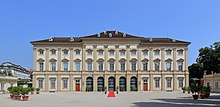Eleanor of Liechtenstein
Princess Maria Eleonore von Liechtenstein, born Princess von Oettingen-Spielberg (* July 7, 1745 in Oettingen , † November 26, 1812 in Vienna ) was the center of the circle of five princesses, in which Emperor Joseph II spent his free time in Vienna.
Life
Her parents were Prince Johann Aloys I. Prince of Oettingen-Spielberg (1701–1780) and Therese Maria Anna, born Duchess of Holstein-Wiesenburg (1713–1745). Her birth cost her mother her life.
Upbringing and marriage
The half-orphan was raised from the age of four to thirteen in a French-speaking monastery in Strasbourg . When she was fifteen, her aunt Maria Eleonore, Duchess of Guastalla , died and left her property in Moravia . Having become wealthy as a result, Eleanor was introduced to the Viennese court and, like her older sister Maria Leopoldine (1741–1795), appointed maid of honor. Both came into close relationships with the daughters of the imperial couple.
While Leopoldine married the eldest son of State Chancellor Kaunitz in 1761 , Eleonore stepped in front of the altar two years later with the later Field Marshal Prince Karl von Liechtenstein (1730–1789). The couple had seven children and founded the Karlische line of the family . After the death of her husband, she had the family crypt of the Charles Line built.
Joseph II and the Five Princesses
In summer Eleonore lived in the Liechtenstein castles Valtice / Feldsberg and Lednice / Eisgrub in Moravia, in winter in Vienna. There, the beautiful Swabian woman formed the center of the circle of the Five Princesses or Five Ladies, created in 1768, in which Emperor Joseph II (1741–1790) found relaxation from government affairs for over two decades. The other members were Maria Josepha Princess Clary (1728–1801), Maria Sidonia Princess Kinsky (1729–1815), Eleonore's sister-in-law Maria Leopoldine Princess Liechtenstein (1733-1809) and Eleonore's sister. In addition to Joseph, only his friends, Field Marshal Lacy (1725-1801) and Chamberlain Orsini-Rosenberg (1723-1796), were allowed to be guests .
The widowed emperor was in love with Eleanor and tried to make her his mistress in 1771/72 , which she refused. His passion then turned into friendship. The circle continued to meet once a week, during Joseph's sole rule (1780–1790) even up to four times. Eleonore's relationship with the "revolutionary on the imperial throne" ( Saul K. Padover ) was not free from tensions, among other things because she rejected his reforms in the ecclesiastical field.
Metternich's sponsor
The Circle of Five Princesses lost its meaning when Joseph died. Among his indecisive successors, Eleanor saw the restlessness of the deceased, which she had often criticized, in a different light. At the time of the Rastatt Congress (1797–1799) she was in opposition to the policies of State Chancellor Thugut , because he was too indulgent to France . She sponsored the future State Chancellor Metternich , who married her niece Maria Eleonore von Kaunitz-Rietberg in 1795. It was probably Eleanor who got Metternich the post of ambassador in Dresden after Thugut's fall . She did not agree with him when he later arranged the marriage of Archduchess Marie-Louise to Napoleon .
Eleanor exchanged letters with her sister throughout her life, giving an insight into life at court and in society. Wolf drew from these and other original sources when he wrote his biography of the princess (see literature).
literature
- Adam Wolf: Princess Eleonore Liechtenstein, 1745–1812, based on letters and memoirs of her time. Vienna 1875 ( digitized ).
- Jacob von Falke: History of the Princely House of Liechtenstein. 3rd volume, Vienna 1882.
- Raoul Auernheimer: Metternich. Statesman and gentleman. Munich 1977, p. 37 f.
- Günther Ebersold: August Prince of Bretzenheim. Norderstedt 2004, p. 242 ff.
- Derek Beales: Joseph II. 2 volumes, Cambridge University Press 1987/2009, especially Volume 1, pp. 324–337, Figure 17a, Volume 2, pp. 20–25.
- Rebecca Gates-Coon: The Charmed Circle. Joseph II and the "Five Princesses," 1765-1790. Purdue University Press, West Lafayette, Indiana 2015, inter alia p. 2 (illustration), 120–127, 343 f. (current location of the archival sources).
Web links
- Entry in the history of the Kaunitz house ( Memento from May 4, 2009 in the Internet Archive ) (archive.org)
| personal data | |
|---|---|
| SURNAME | Liechtenstein, Eleonore von |
| ALTERNATIVE NAMES | Liechtenstein, Maria Eleonore Princess von (full name); Oettingen-Spielberg, Eleonore von (maiden name) |
| BRIEF DESCRIPTION | Salonière |
| DATE OF BIRTH | July 7, 1745 |
| PLACE OF BIRTH | Oettingen |
| DATE OF DEATH | November 26, 1812 |
| Place of death | Vienna |


